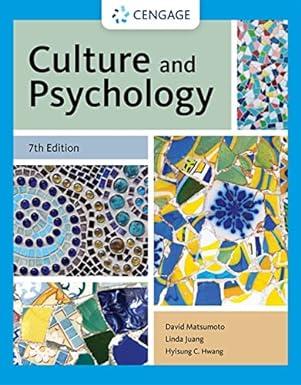4. Some aspects of memory are likely universal. There is no evidence yet to show cultural differences
Question:
4. Some aspects of memory are likely universal. There is no evidence yet to show cultural differences in memory accuracy (Wang & Senzaki, 2019), memory abilities tend to decrease as people get older (or at least people become more selective about what they remember!), and memory decreases with age appear consistent across cultures (Crook et al., 1992). Hindsight bias, which refers to the process in which individuals adjust their memory for something after they find out the true outcome, may also be universal. For example, when someone is asked to guess the number of beads in a jar, they may say 350. When they find out later that the actual number is 647, people will often remember their original estimate to be closer to the true outcome (e.g., 451). Choi and Nisbett (2000) found that Koreans exhibited more hindsight bias than Americans, but Heine and Lehman
(1996) reported no differences between Japanese and Canadians. Pohl, Bender, and Lachmann (2002) also found no cultural differences in hindsight bias among participants from Asia, Australia, Europe, and North America (Pohl, Bender, &
Lachmann, 2002).
Step by Step Answer:

Culture And Psychology
ISBN: 105417
7th Edition
Authors: David Matsumoto, Linda Juang, Hyisung C. Hwang






